- S.D. Eibar ready for maiden La Liga outing
- SD Eibar stengthen ahead of debut La Liga season
- Can ‘Super Mario’ live up to expectations in Madrid?
- MAN IN THE GROUND – Brentford 0 – 4 Osasuna
- Historic Basque derby welcomes S.D. Eibar to La Liga
- Munich to Madrid, via Brazil – Tony Kroos
- Rakitic in Spanish Switch
- Can Spain find redemption in Rio?
- Viva Espana! A season of redemption for Spanish football
- From the old to the new: who can fill the void in years to come for La Roja?
Spotlight Season: A Season in Hell for Atlético Madrid – 2000/01
- Updated: 11 April, 2012
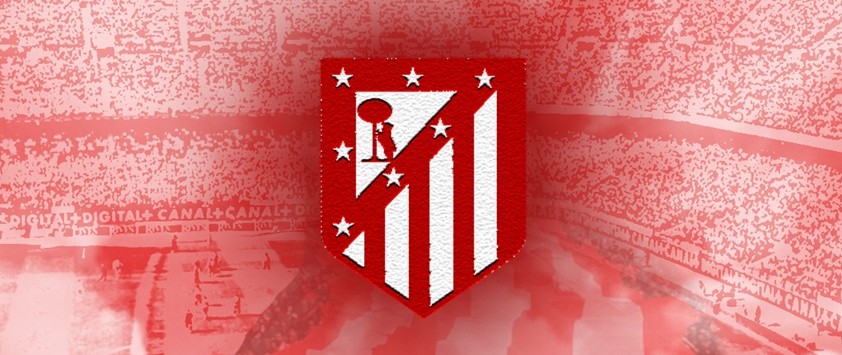
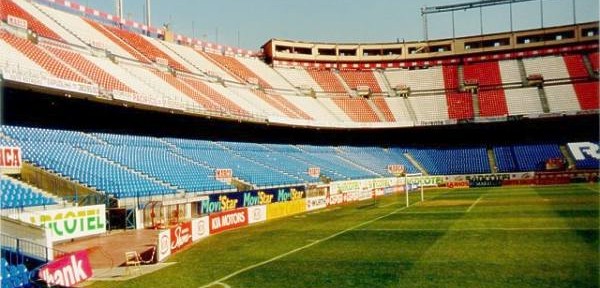
Background
The conversion in 1992 of many of Spain’s leading clubs to Sociedades Anónimas Deportivas weighed heavily on a number of outfits as the decade wore on. The necessity for greater financial transparency was something that did not sit comfortably at the top of the Spanish game, with Sevilla & Celta Vigo only receiving a reprieve from demotion to Segunda B, on the eve of the 1995-96 season.
The need for clubs to provide endorsements against any debts amassed saw many of Spain’s big clubs struggle. This culminated in May 2000, when the La Primera campaign concluded with the relegation to La Segunda of three of Spain’s biggest institutions, namely Real Betis, Sevilla FC and Atlético Madrid.
 The story of the campaign
The story of the campaign
Atlético president Jesus Gil brushed off relegation to the second division as an inconvenience, saying that the club would have a “Season in Hell” before returning to the top flight.
Unfortunately for Atléti, “Hell” was not particularly welcoming and an appalling start to the season saw the team lose its first three fixtures and win only one of the next four.
In fact, only Sevilla made a convincing start to the season, as Betis also struggled to adapt to life in La Segunda.
At the half-way stage, Sevilla on 40, led Betis by a point, with Tenerife three points further back in third. In truth however, every team showed startling levels of inconsistency, which offered Atlético a crumb of comfort as they sat in mid-table, ten points off the promotion places.
By week 33, Atlético had reduced the gap on third place to two points, but defeats in weeks 34 & 35 saw the momentum swing back to Tenerife. In the run-in, Sevilla pulled away to claim the title with two games to go, but Betis and Tenerife faltered. The final weekend saw Betis, Tenerife and Atlético Madrid separate by a single point, with two places in La Primera up for grabs.
The final set of fixtures saw all three protagonists on the road, with Betis at Real Jaén, Tenerife at Leganés and Atlético making the short journey to already relegated Getafe. Tenerife and Atléti were separated by a goal difference of six in favour of the team from the Canarias, as both sides had beaten each other by 2 goals to one.
With the crowd limited to 15,000 at Getafe’s Colisuem Alfonso Perez, many Atléti fans chose to cheer on Leganés, ensuring that Tenerife faced a hostile atmosphere. Betis calmed their nerves as early as the 2nd minute when Casas scored, and Atlético edged into third place when Luque scored in the 28th minute. Betis sealed second place when Casas added to his tally in the 71st minute. Then, with 17 minutes of normal time remaining, Tenerife’s Hugo Morales struck a vital winner, silencing Atlético’s support in two separate stadiums.
Extras
Jesus Gil was a man not renowned for his patience, but this season saw him at his most extreme, getting through 3 managers. First to go, after week 6, was Fernando Zambrano. His successor was former Sevilla coach Marcos Alonso, who guided the club to the semi-finals of the cup, but was sacked following the 0-3 reverse at home to Real Murcia in week 35.
B Team coach Carlos García Cantarer saw out the remaining seven games. Atlético did reach the semi-finals of the Copa del Rey, losing 1-2 on aggregate to the eventual winners, Real Zaragoza.
For the Record
The 2000-01 campaign may be remembered for many things, but goal scoring is not one of them. A paltry 2.19 goals were scored per match, with champions Sevilla topping the charts with 66 strikes. Recreativo conceded fewest goals, with just 29 entering the back of their net. However it was the size of the attendances that is the season’s most memorable statistic.
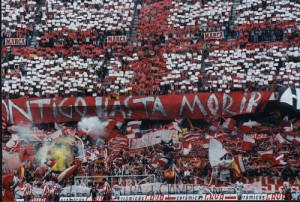 An incredible 4.8 million fans watched football in La Segunda in 2000-01, thanks in no small part to the presence of so many big clubs.
An incredible 4.8 million fans watched football in La Segunda in 2000-01, thanks in no small part to the presence of so many big clubs.
Atlético topped the charts with an average home attendance of 42,950, only bettered by Real Madrid and Barcelona in La Primera.
Sevilla & Real Betis both averaged crowds of 30,000 for their home fixtures, and the division as a whole witnessed a 60% year on year increase in attendances.
Pichichi
Atlético Madrid’s Salva Ballesta was the division’s top scorer with 21 goals. Sala was a Journeyman professional who started out at Sevilla B in 1993. He left in summer 2001 for Valencia where he won League Championship a year later. He scored a total of 145 goals in 400 senior appearances and played 4 times for La Seleccion between 2001-05.
Zamora
César Quesada of Recreativo Huelva was top goalkeeper in La Segunda. Quesada debuted for Elche in 1988, but left the club following their relegation to Segunda B in 1993. His career appeared to be in the doldrums, playing for a series of lowly Segunda B clubs, before signing for Recreativo in 1996. Here he earned promotion to La Primera in 2002 and retired after leading them to the cup final in 2003.
The Clubs today
Any reunion of the class of 2000-01 would be a fairly makeshift affair, with the eleven intervening seasons full of incident for the participants. Sevilla, Real Betis, Atlético Madrid, Sporting Gijón, Levante and Getafe now play in the top flight, but not all have made a direct ascent, as Getafe dropped to Segunda B before making the top grade.
Only Elche, Córdoba, Real Murcia and Recreativo Huelva can be found in this season’s second division, with Elche the only club that has remained in situ. Tenerife, Albacete, Leganés, Salamanca, Eibar, Badajoz and Real Jaén all play their football in Segunda B, whilst Racing Ferrol play in the Tercera and SD Compostela play in the Galician regional leagues. Three of the season’s contestants have disappeared from view, with CF Extremadura closing in 2010 and Universidad de Las Palmas & UE Lleida departing last summer.




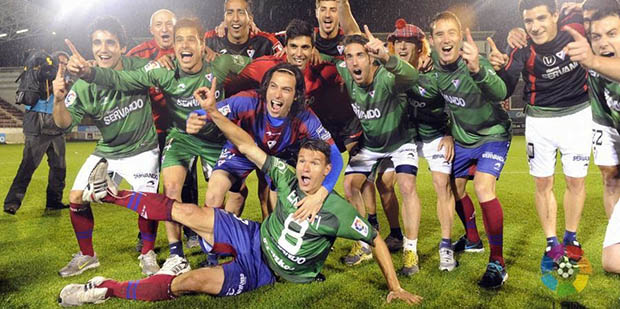
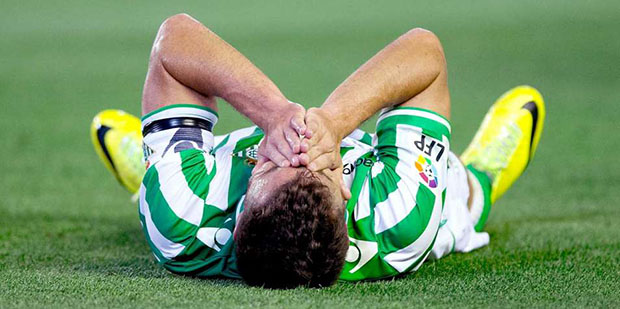


You must be logged in to post a comment Login